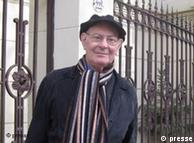Arts on the Air | 24.09.2008 | 05:30
Influential 20th century composer Mauricio Kagel dies (Interview)
On September 18th, the composer Mauricio Kagel died at the age of 76.
Although born and educated in Argentina, Mauricio Kagel was a long-time resident of Germany, and for more than half a century he was one of the most inventive and wide-ranging figures in contemporary music. Kagel’s work defied easy characterisation. He adhered to no recognisable idiom or style, and he was at pains throughout his career to establish no school.
Mauricio Kagel was born in Buenos Aires in 1931, to a polyglot Jewish family who had arrived in South America from Eastern Europe in the late 1920s. Preferring to read philosophy and literature at university rather than attend a conservatory, he studied music intensively with private teachers, taking lessons in theory, piano, organ, cello, singing and conducting. As a composer he was self-taught, his work influenced as much by his literary and philosophical studies as by any musical studies. In this week's Arts on the Air we remember the vivacious Mauricio Kagel in one of his last interviews ever.
Interview: Mauricio Kagel / Breandáin O’Shea
Mauricio Kagel, 76, Writer of Avant-Garde Music, Is Dead
Mauricio Kagel, an avant-garde composer whose often absurdist works blurred the boundaries between music, theater and film, died on Wednesday in Cologne, Germany. He was 76.

Mauricio Kagel in 2000.
His death was announced by his music publishing house, C. F. Peters Musikverlag. No cause was given.
By temperament a dadaist and provocateur, Mr. Kagel drew on the musical examples of composers like John Cage and Karlheinz Stockhausen. In “Anagrama,” a work from the 1950s, singers and instrumentalists were called on to emit notes, squeaks, whispers and shouts corresponding to an elaborate system derived from the letters in a Latin palindrome.
In works like “Der Schall” (1968) and “Acustica” (1968-70), he made use of cash registers, car horns, ratchets and walkie-talkies to create bizarre aural effects, and in works he described as “instrumental theater” he prescribed specific attitudes and gestures for the performers to enact.
Mauricio Raúl Kagel grew up in Buenos Aires, where his parents had fled from the Soviet Union in the 1920s. Although he took private lessons on piano, organ and cello, as well as in singing, conducting and theory, he was self-taught as a composer.
After studying literature and philosophy at the University of Buenos Aires, he collaborated with an avant-garde group, the Agrupación Nuevo Mundo; helped found the Cinémathèque Argentine; and wrote film criticism. In 1955 he became the chorus director and rehearsal accompanist at the Teatro Colón.
At the encouragement of the composer Pierre Boulez, he left for West Germany in 1957 and settled in Cologne, where he conducted concerts of contemporary music with the Rhineland Chamber Orchestra and was a visiting lecturer at the Darmstadt summer courses for new music.
In 1969 he was named director of the Institute of New Music at the Rheinische Musikschule in Cologne and the successor to Stockhausen as the director of the Cologne Courses for New Music. He helped found the Cologne Ensemble for New Music. In 1974 he became the professor of new music and theater at the Musikhochschule in Cologne.
Among his more notable works are “Staatstheater” (1967-70) a disassembled opera, minus plot and libretto, consisting of nine sections to be performed in any order, and the film “Ludwig van” (1970), whose soundtrack derives from pages of Beethoven’s music plastered on the walls of a set representing the composer’s studio. Because the sheet music wraps around edges and curves, Mr. Kagel in effect held Beethoven up to a fun-house mirror.

沒有留言:
張貼留言